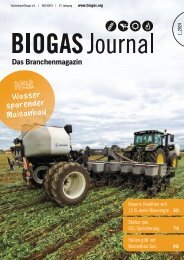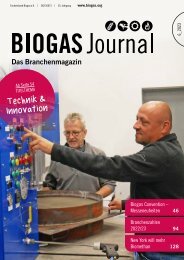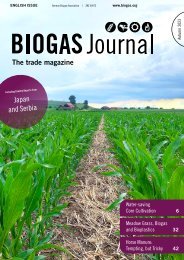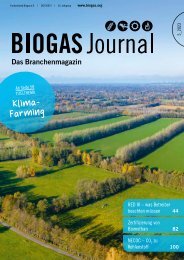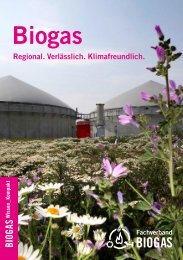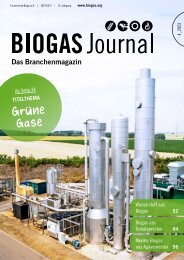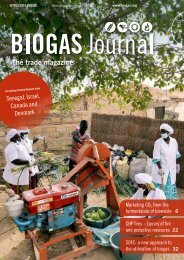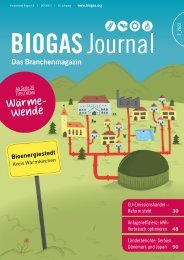You also want an ePaper? Increase the reach of your titles
YUMPU automatically turns print PDFs into web optimized ePapers that Google loves.
Significance of waste digestion in developing countries<br />
As a rule, roughly 10 kg of kitchen and market<br />
waste are needed <strong>to</strong> produce 1 – 1.5 m 3 of biogas.<br />
This amount of biogas contains approximately 6<br />
kWh of energy which substitutes 0.5 l of diesel fuel.<br />
After roughly 25 years of step-by-step improvements<br />
and practical experience, biogas technology is still attracting<br />
interest as a contribution <strong>to</strong> renewable energy<br />
production, thereby creating independence from fossil<br />
fuels. In China, an estimated <strong>to</strong>tal of 40 million domestic<br />
systems were installed by 2011. India is home <strong>to</strong><br />
approximately 4 million domestic biogas systems, and<br />
Vietnam had installed more than 100,000 systems by<br />
2010. Further Asian countries <strong>to</strong> be highlighted are<br />
Cambodia, Laos, Indonesia, and Nepal (225,000 by<br />
2011). In Africa, where anaerobic digestion is less<br />
prevalent due <strong>to</strong> climatic reasons, countries like Kenya<br />
and Uganda (approximately 7,500 by 2017) are<br />
amongst the frontrunners regarding domestic biogas installations,<br />
while in the Republic of South Africa a significant<br />
number of mid- and large-scale biogas plants<br />
exist. In Latin America, apart from small biogas plants<br />
for rural households, numerous agricultural waste projects<br />
have been implemented, and in the urban environment<br />
biogas is being extracted from several landfills<br />
(landfill gas).<br />
As mentioned, anaerobic digestion of organic household<br />
waste in centralised high-technology plants has<br />
become a standard in industrialised countries. On the<br />
other hand, most regions of developing countries still<br />
lack appropriate low-technology options. As a result,<br />
anaerobic digestion as a waste treatment option for<br />
urban settings, predominantly processing kitchen or<br />
market waste, still plays a negligible role. There is little<br />
knowledge and information available or accessible<br />
on technical and operational feasibility, challenges and<br />
opportunities.<br />
In developing countries, the largest share of the MSW<br />
consists of organics, and a relatively small amount of<br />
glass, metals, paper and plastics. However, income<br />
level, economic growth, lifestyle, and location strongly<br />
influence MSW composition. Also, the composition of<br />
municipal biowaste can change during the year given<br />
seasonal variations and habits.<br />
Organic waste recovery and recycling is still fairly limited<br />
in developing countries and emerging economies.<br />
Next <strong>to</strong> direct animal feeding, mulching of gardens, and<br />
composting – or burning – the most common practice<br />
for disposal of organic waste is dumping in<strong>to</strong> unsanitary<br />
landfills or open dumpsites, mixed with other waste<br />
streams. However, the recycling of organic waste would<br />
significantly reduce the amount of waste that needs<br />
handling and thus reduces costs at the disposal facilities.<br />
Less organic waste at the disposal site prolongs its<br />
life span, and also reduces the environmental impact of<br />
the disposal site, as the organics are largely responsible<br />
for the polluting leachate, CH 4<br />
and odour problems.<br />
The implementation of anaerobic digestion or composting<br />
as one step in a city-wide solid waste management<br />
programme reduces the flow of biodegradable materials<br />
<strong>to</strong> landfills. Nevertheless, its feasibility depends on the<br />
market demand for the end products (gas, digestate or<br />
compost), as well as the technical and organisational<br />
set-up of the individual facilities. Enabling clear legislation,<br />
policy and municipal strategies in terms of<br />
organic waste management are further important prerequisites<br />
for successful initiatives.<br />
The characteristics of the waste materials used for biogas<br />
production are highly dependent on the collection<br />
system, and one of the fundamental issues is whether<br />
the collected waste is contaminated by inorganic ma-<br />
Compacting mixed<br />
waste on a landfill<br />
30









